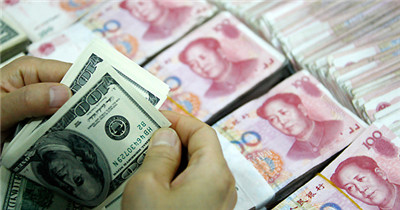(单词翻译:单击)
The renminbi is on a seemingly inexorable march towards becoming a global currency. It is widely used in international trade and finance transactions. Now China wants the International Monetary Fund to label the renminbi an official reserve currency by including it in the exclusive group that makes up its unit of account, the Special Drawing Rights. That group comprises the dollar, the euro, the yen and sterling.
人民币正在以一种看似不可阻挡的势头向成为世界货币挺进。它在国际贸易和金融交易中得到广泛使用。现在,中国希望国际货币基金组织(IMF)通过将人民币纳入构成其记账单位——特别提款权(SDR)——的固定货币篮子,使人民币成为一种官方储备货币。这个货币篮子由美元、欧元、日元和英镑四种货币组成。

There are good reasons to welcome the renminbi’s rise. Its trajectory is closely correlated with banking and other reforms that will make China’s economy more market friendly. These are necessary to establish a more balanced and less-risky growth path, one that is less dependent on investment, generates more employment and reduces environmental degradation. Economic reformers in China have built public support for the idea that a great economic power should be home to an important international currency.
目前有充分理由欢迎人民币崛起。人民币的崛起轨迹与中国银行业及其他领域的改革密切相关,这些改革将增强中国经济的市场友好性。这些改革对于确立一条更加平衡、风险更低的增长路径是必需的,这条路径对投资不那么依赖,可以创造更多就业并减轻环境恶化。中国的经济改革者已经培养了公众对这样一种理念的支持,即一个经济强国应该拥有一种重要的世界货币。
For this to happen, the country must undertake a series of domestic reforms: it needs a better and well-regulated banking system; a broader range of financial markets, including basic currency derivatives; fewer restrictions on the flow of capital in and out of the economy; and a more flexible exchange rate.
要实现这一目标,中国必须进行一系列国内改革:它需要一个更完善、监管良好的银行系统;品种更丰富的金融市场,包括基本的外汇衍生品;减少对资本流入和流出的限制;以及更灵活的汇率。
These reforms will permit a more efficient allocation of domestic savings to sectors that can generate higher employment and productivity growth. A better financial system will give small and medium-sized enterprises, especially those in the services sector, increased access to credit. Allowing freer capital outflows is already giving households opportunities to diversify their savings and secure better returns.
这些改革将使国内储蓄更高效地分配到能够创造更多就业和更高生产率增长的行业。一个更完善的金融体系将给予(尤其是服务业的)中小型企业更多获得贷款的机会。部分放松资本流出管制,已经正在给中国家庭带来将储蓄进行分散投资并获得更高回报的机会。
But there is fierce political opposition to these reforms, which challenge the privileges of powerful vested interests. To overcome the resistance, the government has taken up the rallying cry of making the renminbi a global currency and is ploughing ahead with its reforms.
但针对这些挑战强大既得利益特权的改革,政治上的反对非常激烈。为了克服改革的阻力,中国政府已经喊出“让人民币成为世界货币”的战斗口号,正马不停蹄地推进改革。
To take one example: the People’s Bank of China has made a commitment to eliminate the ceiling on interest rates on bank deposits this year. This will force banks to compete for deposits, giving households a better return on their savings. Large lenders have resisted, wary of competition from smaller rivals. The central bank has fought back, noting that China needs fully market-determined interest rates for the renminbi to become a reserve currency.
一个例子是:中国央行(PBoC)表示,今年有很大概率将取消银行存款利率上限。这将迫使银行相互竞争以吸收存款,让家庭获得更高的储蓄回报。由于担心来自规模较小银行的竞争,大型银行一直在抵制这一改革。央行已进行回击,指出要使人民币成为储备货币,中国需要完全由市场决定利率。
Reformers in China recognise that the renminbi’s prominence in global finance is a mixed blessing. It would become harder to control the currency’s value but its official recognition as a reserve currency would be an important validation of reform efforts. For their part, the US government and others should welcome the renminbi’s rise.
中国的改革者承认,人民币在全球金融中的重要地位有利也有弊。控制人民币汇率将变得更加困难,但正式承认人民币为储备货币将是对中国改革努力的重要认可。对美国及其他国家的政府来说,应该欢迎人民币的崛起。
A more open capital account makes it harder for the central bank to manage or “manipulate” the value of its currency, countering US concerns that Chinese exporters have an unfair advantage from a cheap currency. Stronger demand for the currency will mean a higher exchange rate, making imported goods cheaper for Chinese consumers and giving a leg up to foreign exporters.
一个更加开放的资本账户将使中国央行更难于管理或“操纵”人民币汇率,打消美国对中国出口商从廉价货币中获得不公平优势的担忧。对人民币更强劲的需求意味着更高的汇率,使中国消费者可以买到更便宜的进口商品,并对外国出口商起到提振作用。
Opening up China’s financial market could create opportunities for foreign companies, from banks to insurers. With a more flexible exchange rate, China will no longer accumulate large foreign exchange reserves, reducing its contribution to global current account imbalances. The IMF’s imprimatur is nice to have but ultimately it is market forces that will drive the renminbi’s adoption as a reserve currency. If foreign investors, including central banks, see the renminbi as a currency worth holding, they will hold it. Indeed, many countries hold small amounts in their foreign exchange portfolios.
开放中国金融市场能够为从银行到保险公司的各类外国企业创造机会。更灵活的汇率将使中国不再积累大量外汇储备,减少其对全球经常账户失衡的贡献。IMF的认可固然值得高兴,但最终驱动人民币被采纳为储备货币的将是市场力量。如果外国投资者(包括各央行)认为人民币值得持有,它们就会持有人民币。实际上,很多国家在自己的外汇投资组合中持有少量人民币。
There is little prospect, however, that the renminbi will become a dominant global reserve currency. Fundamental political and legal reforms, needed to build trust among foreign investors, are not on the cards. The dollar’s position is secure for now.
不过,人民币成为占主导地位的全球储备货币可能性不大。培养外国投资者对人民币的信任需要从根本上进行政治和司法改革,而这样的改革不可能出现。目前看来,美元的地位是安全的。
Official validation of the renminbi’s rise is important for the IMF. It would avoid another knock to the institution’s legitimacy, which is shaky given the stalling of reforms to give emerging economies their rightful voting share.
正式认可人民币崛起,对于IMF来说很重要。这将避免该机构的合法性再次遭到打击,因迟迟没有进行改革、以给予新兴经济体应得的投票权,IMF的合法性已遭到质疑。
For China and others, a negative ruling on reserve currency status could symbolise their concerns that the IMF remains an institution run by and for the benefit of advanced economies. A positive outcome will give Beijing a vested interest in maintaining the fund’s primacy in international finance.
对中国和其他国家来说, IMF不认可人民币储备货币地位将凸显它们的担忧,即IMF仍是一个由发达经济体管理并为其利益服务的机构。而IMF认可人民币储备货币地位将使中国政府成为既得利益者,维护IMF在国际金融中的首要地位将保住这份既得利益。
The renminbi’s rise could be a constructive force for change in China and the international monetary system. It should be embraced.
人民币的崛起可以成为促进中国及国际货币体系变革的建设性力量,应当受到欢迎。
The writer is a professor at Cornell University, a fellow at the Brookings Institution and former head of the IMF’s China division
本文作者是康奈尔大学(Cornell University)教授、布鲁金斯学会(Brookings Institution)研究员以及IMF中国部前负责人


